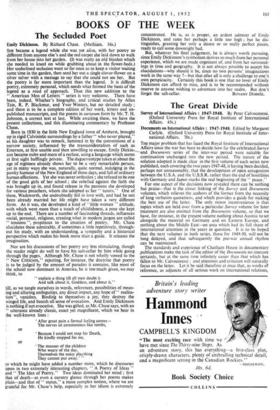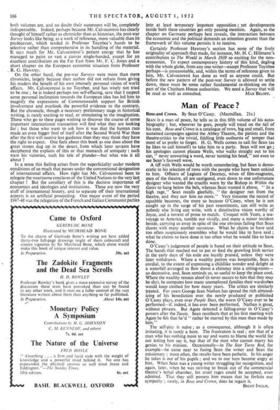The Great Divide
Survey of International Affairs : 1947-1948. By Peter Calvocoressi. (Oxford University Press for Royal Institute of International Affairs. 45s.) THE major problem that has faced the Royal Institute of International Affairs since the war has been to decide how far the celebrated Survey Documents series of the inter-war period were suitable for continuation unchanged into the new period. The nature of the solution adopted is made clear in the first volume of each series now published, each covering the two years 1947-48, it having been decided, perhaps not unreasonably, that the development of open antagonism between the U.S.A. and the U.S.S.R. rather than the end of hostilities with Germany and Japan marks the real beginning of the " peace."
For one aspect of the decisions now revealed there can be nothing but praise—that is the closer linking of the Survey and Documents volumes, which relieves the authors of the former from the necessity of long verbatim quotations, and which provides a guide for making the best use of the latter. The only minor inconvenience is that topics which are held over from a particular Survey volume for later treatment are also omitted from the Documents volume, so that we have, for instance, in the present volume nothing about Austria to set alongside the material on Germany and on Eastern Europe, and nothing about the Middle East—an area which had its full share of international attention in the years in question. It is to be hoped that the next volumes in both series, those for 1949-50, will not be long delayed, and that subsequently the pre-war annual rhythm can be maintained.
The standards and experience of Chatham House in documentary ,publications make the task of the editor of the Documents no sinecure certainly, but at the same time infinitely easier than that which has fallen to Mr. Calvocoressi ' • and attention and criticism will naturally focus on the latter. Let itbe said therefore at once that, as works of reference, as adjuncts of all serious work on international relations, both volumes are, and no doubt their successors will be, completely indispensable. Indeed, perhaps because Mr. Calvocoressi has clearly thought of himself rather as chronicler than as historian, the post-war Survey looks like being, as a work of reference, more valuable than its predecessor, which tended in Professor Toynbee's hands to be selective rather than comprehensive in its handling of the material. It says much for Mr. Calvocoressi's patient energy that he has managed to paint so vast a canvas single-handed, except for an excellent contribution on the Far East from Mr. F. C. Jones and a short chapter on the European economic situation from Professor R. G. Hawtrey.
On the other hand, the pre-war Surveys were more than mere chronicles, largely because their author did not refrain from giving his readers the benefit of his own intensely personal vision of world affairs. Mr. Calvocoressi is no Toynbee, and has wisely not tried to be one ; he is indeed perhaps too self-effacing, save that I suspect some personal inclination towards the European idea has led him to magnify the expressions of Commonwealth support for British involvement and overlook the powerful evidence to the contrary. But the chronicle, though a necessary preliminary stage in historical writing, is rarely exciting to read, or stimulating to the imagination. Those who go to these pages wishing to discover the course of some important international transaction will find what they are looking for ; but those who want to ask how it was that the human race made an even bigger fool of itself after the Second World War than after the first will receive less guidance than they may think they have the right to expect. One feels about this book as one does about the great stones dug up in the desert, from which later savants have deciphered the exploits of this or that monarch of antiquity : such were his victories, such his tale of plunder—but what was it all about ?
In a sense this feeling arises from the superficiality under modern conditions of so much that passes under the conventional designation of international affairs. How right has Mr. Calvocoressi been to relegate the wearisome conclaves of the United Nations to the very last chapter ! But the corollary of this is the decisive importance of economics and ideologies and institutions. These are now the very stuff of international history, and to separate off their international aspects is an artificial proceeding. One major event of the period 1947-48 was the relegation of the French and Italian Comminist parties into at least temporary impotent opposition ; yet developments inside both these countries get only passing mention. Again, as the chapter on Germany perhaps best reveals, the interaction between the economic and the political demands an attention greater than the framework of this volume permits it to receive.
Certainly Professor Hawtrey's section has none of the lively originality of approach that made, for instance, Mr. H. C. Hillman's contribution to The World in March 1939 so exciting for the non- economist. To expect contemporary history of this kind, defiling with the whole globe, from any one writer—except Professor Toynbee perhaps—is unreasonable, and, within the terms of reference given to him, Mr. Calvocoressi has done as well as anyone could. But before the new pattern of the post-war Survey is allowed to settle down, there must be some rather fundamental re-thinking on the part of the Chatham House authorities. We need a Survey that will



























 Previous page
Previous page